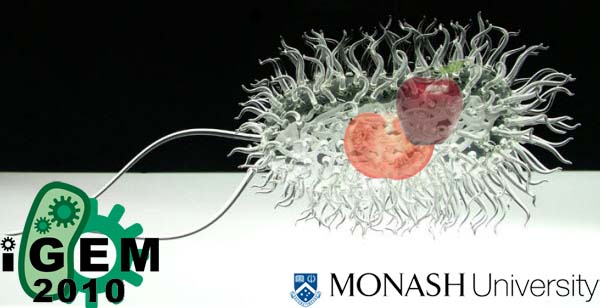Team:Monash Australia
From 2010.igem.org
(→Monash iGEM 2010 project description) |
|||
| (24 intermediate revisions not shown) | |||
| Line 1: | Line 1: | ||
| - | + | {{Template:Team:Monash_Australia/Nav2}} | |
| - | + | ||
| - | + | == Monash iGEM 2010 project description == | |
| - | + | ||
| - | + | ||
| - | + | ||
| - | + | ||
| - | + | ||
| - | + | ||
| - | + | ||
| - | + | ||
| - | + | ||
| - | + | ||
| - | + | ||
| - | + | ||
| - | + | The 2010 Monash University iGEM team is working on an exciting project to re-engineer <i>Escherichia coli</i> to produce ethylene gas. Ethylene is a vital feedstock for a plethora of products. For example, polyethylene, the ubiquitious plastic used to produce billions of plastic bags every year, is composed of a string of ethylene molecules. | |
| + | Currently, ethylene is produced by heating crude oil to 900 °C (1,652 °F) and passing it through saturated steam in a process called steam cracking. This method is extremely energy intensive and dependent on non-renewable petrochemicals. Consequently ethylene production is a large source of carbon pollution that is pushing the earth towards dangerous climate change. | ||
| + | It doesn’t have to be this way. We are developing an <i>E. coli</i> based ethylene production machine that can operate at room temperature using a simple, inexpensive and renewable growth medium. We analysed various pathways for the production of ethylene and found that the Yang cycle is used by plants to synthesise ethylene as a hormone. There are three key enzymes in the pathway. We have designed a system that links them for seamless and efficient ethylene production from L-Methionine. | ||
| + | Our system has tremendous potential as a more energy efficient pathway to ethylene production in a post-fossil fuel economy. In the future, plastic will be grown in bioreactors and not drilled from the ground. We believe our construct is a stepping stone towards renewable bio-plastic production that will inspire other iGEM students and scientists to develop cleaner production methods. | ||
| - | |||
| - | |||
| - | |||
| - | |||
| - | |||
| - | |||
| - | |||
| - | |||
| - | |||
| - | |||
| - | |||
| - | < | + | <center> |
| - | + | [[Image:Monash_Australia_Ecoli.jpg]] | |
| - | + | </center> | |
| - | + | ||
| - | + | ||
| - | + | ||
| - | + | ||
| - | + | ||
| - | + | ||
| - | + | ||
| - | + | ||
| - | + | ||
Latest revision as of 22:58, 18 October 2010

|
|
|||
Monash iGEM 2010 project description
The 2010 Monash University iGEM team is working on an exciting project to re-engineer Escherichia coli to produce ethylene gas. Ethylene is a vital feedstock for a plethora of products. For example, polyethylene, the ubiquitious plastic used to produce billions of plastic bags every year, is composed of a string of ethylene molecules. Currently, ethylene is produced by heating crude oil to 900 °C (1,652 °F) and passing it through saturated steam in a process called steam cracking. This method is extremely energy intensive and dependent on non-renewable petrochemicals. Consequently ethylene production is a large source of carbon pollution that is pushing the earth towards dangerous climate change.
It doesn’t have to be this way. We are developing an E. coli based ethylene production machine that can operate at room temperature using a simple, inexpensive and renewable growth medium. We analysed various pathways for the production of ethylene and found that the Yang cycle is used by plants to synthesise ethylene as a hormone. There are three key enzymes in the pathway. We have designed a system that links them for seamless and efficient ethylene production from L-Methionine. Our system has tremendous potential as a more energy efficient pathway to ethylene production in a post-fossil fuel economy. In the future, plastic will be grown in bioreactors and not drilled from the ground. We believe our construct is a stepping stone towards renewable bio-plastic production that will inspire other iGEM students and scientists to develop cleaner production methods.
 "
"
